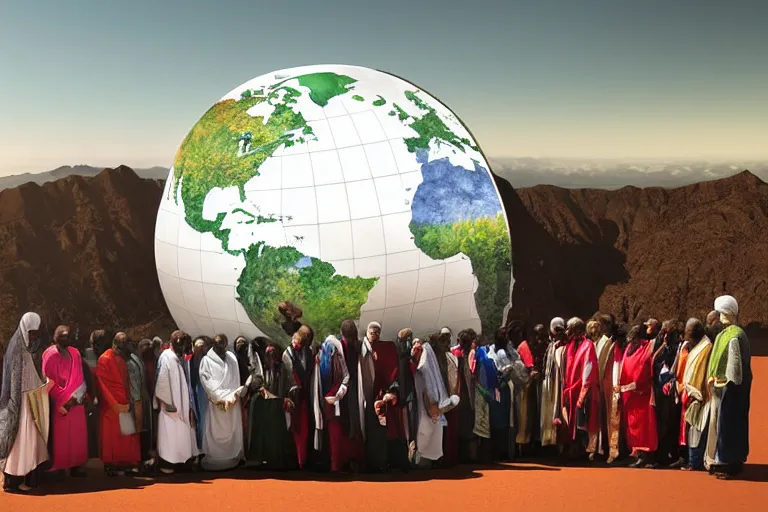Explore the unique teachings, history, and practices of Bahá’í Faith and understand its distinctiveness from other religions.
Bahá’í is a relatively modern religion that originated in the 19th century. It has gained significant popularity worldwide due to its emphasis on unity, peace, and social justice. In this article, we will delve into the teachings, history, and practices of Bahá’í Faith and compare it with other major religions.
The Origins and Foundations of Bahá’í
Imagine stepping back in time to the tumultuous period of the 19th century, when a young man named Baha’u’llah emerged from Persia (modern-day Iran), bearing a message that would challenge and transform religious thought. Baha’u’llah’s origins are as mysterious as they are profound; he claimed to be the latest in a long line of divine messengers, including Jesus Christ and Muhammad. This claim sets Bahá’í apart from other religions by positioning it within a lineage that spans millennia.
One of the most striking aspects of Bahá’u’llah’s revelation is its emphasis on unity. The religion teaches that all true prophets have come with the same message, promoting love and peace among humanity. This idea challenges the notion of religious exclusivity, often prevalent in other faiths where certain beliefs are seen as superior or more pure.
Another foundational principle of Bahá’í is the belief in the progressive revelation of God’s will through history. Each major religion is seen as a step towards a greater understanding and unity among all people. This concept contrasts sharply with religions that view their scriptures as the ultimate and unchanging word from God, without room for development or reinterpretation.
Moreover, Bahá’u’llah’s teachings on social justice and equality are revolutionary. The religion calls for the elimination of prejudice based on race, gender, and socio-economic status. This is a stark difference from many traditional religions that often support hierarchical structures within their communities. How would you feel if your faith demanded that everyone be treated as equal under God’s gaze?
The Bahá’í Faith also places great importance on the unity of science and religion. Baha’u’llah asserts that both must coexist harmoniously, with science uncovering the truths of nature while religion provides a moral framework for human conduct. This integration sets it apart from religions that often see science as a threat or an enemy.
So, what does all this mean? It means Bahá’í is not just another religious tradition; it’s a response to the challenges and complexities of our modern world. Its teachings offer a pathway towards unity, peace, and progress. As we continue our journey through Bahá’í, exploring its core teachings, remember that these principles are not just historical curiosities but living forces that can transform our lives today.
The Teachings of Bahá’í
The teachings of Bahá’í are like a beacon, guiding humanity towards unity and peace. But how do they differ from other religions? Is it just another path to the same destination, or does it offer something unique? The answer lies in its core principles, which emphasize unity, peace, and social justice. These teachings resonate deeply because they address the fundamental issues of our time—divisions that often lead to conflict and inequality.
Imagine a world where all religions are seen not as separate paths but as different branches of one tree—the Tree of God. In Bahá’í, the oneness of religion is central. It teaches that the foundational truths of major faiths—like love for others and service—are not in conflict but complement each other. This unity is not just a philosophical concept; it’s an active practice that seeks to reconcile differences and foster harmony.
The Bahá’í emphasis on social justice goes beyond personal morality, delving into the structural issues that affect communities. It challenges us to think about how wealth, power, and opportunity are distributed in society. The teachings urge believers to work towards creating a more just world where everyone has equal access to education, healthcare, and resources.
Moreover, the concept of progressive revelation is central to Bahá’í thought. It posits that the divine message evolves over time, adapting to humanity’s changing needs and understanding. This means that while Bahá’í respects past prophets and their teachings, it sees its own religion as a continuation and fulfillment of previous revelations.
These teachings are not just theories; they’re practical applications meant to transform individuals and communities. When you delve into the core teachings of Bahá’í, you find a profound commitment to action—action that seeks to bridge divides and build a better world for all. How can such a vision not stand out in a world often divided by dogma and strife?
The History of Bahá’í
The history of Bahá’í, much like its teachings, is a tapestry woven with threads of resilience, unity, and progress. Imagine tracing the origins of a river that starts from humble springs and grows into a mighty stream; this parallels the journey of Bahá’u’lláh, the founder of the Bahá’í Faith, in the early 19th century.
What led Bahá’u’lláh, a former nobleman turned prophet-teacher, to declare his mission while imprisoned? His declaration marked the beginning of a new era, one that sought to bridge the gaps between different faiths and cultures. This was not just a personal epiphany but a call to action for all humanity.
After Bahá’u’lláh‘s imprisonment in Iran, his writings began to spread beyond the borders of Persia. His son, Mirza Muhammad Ali (Abdu’l-Baha), played a crucial role in this dissemination. Through his travels and teachings, Abdu’l-Baha helped shape the Bahá’í Faith into what it is today. He emphasized the unity of religion and stressed the importance of social justice and peace.
The establishment of the Universal House of Justice by Abdu’l-Baha in 1963 further solidified the organizational structure of the Bahá’í community. This body serves as the highest governing council, ensuring that the teachings of Bahá’u’lláh are upheld and interpreted for the modern era.
The history of Bahá’í is not merely a chronological account; it’s a story of evolution. From its inception in 1863 to the present day, Bahá’ís have continually adapted their practices and beliefs to meet the needs of an ever-changing world. This adaptability reflects the core teachings of unity and progress that permeate the faith.
As we look back at this history, it becomes clear that the Bahá’í Faith is not just a religion but a living entity, constantly evolving to address the challenges faced by humanity. Its journey is one of continuous growth, much like a tree that expands its branches to embrace new sunlight and challenges.
How does this rich historical tapestry set Bahá’í apart from other religions? It’s in the emphasis on unity and the belief that all major world religions share the same divine origin. This perspective fosters a sense of interconnectedness among followers, transcending the divisions often found within traditional religious frameworks.
The unique history of Bahá’í is like a beacon guiding us towards a future where diversity coexists in harmony. As we continue to explore this faith, it becomes evident that its teachings and practices are not just historical artifacts but living principles for creating a more unified and just world.
Bahá’í Practices and Customs
Bahá’í practices and customs are woven into the fabric of daily life, much like threads interwoven to create a tapestry. One of the most recognizable is daily prayer. Bahá’ís believe in the power of prayer as a means of communication with God and seek to incorporate it into their routines. But how does this differ from other religious practices? Imagine praying at specific times each day, much like hitting the pause button on your life for a few minutes; is this not akin to setting aside time for spiritual nourishment?
Another unique practice is fasting. From March 2 through March 20, Bahá’ís abstain from food and drink from sunrise to sunset as a means of self-purification. This period is often compared to the dark night of the soul in spiritual literature, offering a reflective period for introspection and self-improvement. How does fasting in Bahá’í differ from similar practices in other religions? Is it not about more than just physical abstinence—it’s also about spiritual growth?
The pilgrimage to the Shrine of Bahá’u’lláh in Haifa, Israel, is another profound practice. For Bahá’ís, this journey is a symbol of unity and a reminder of their shared faith. It’s akin to climbing a mountain, where one ascends through layers of challenges until they reach a place of spiritual elevation. How does this pilgrimage compare to the holy pilgrimages in other religions? Is it not about more than physical travel—it’s also about spiritual transformation?
The unique aspect of these practices is their emphasis on unity and service. Bahá’ís believe that prayer, fasting, and pilgrimage should be expressions of their commitment to serving others and building a just society. This approach contrasts with some other religions where such practices might focus more on individual salvation or adherence to dogma.
In essence, these customs are not just rituals but powerful tools for personal and collective transformation. They reflect the Bahá’í belief in the oneness of humanity and the unity of purpose that binds all people together. How do you see your own life being enriched by practices like these? Can they be a means to foster greater harmony and understanding in our interconnected world?
These practices, when embraced with sincerity and devotion, can serve as pathways to deeper spiritual experiences and a more meaningful life. They are not just about following rules but about living a life of purpose and service.
Comparing Bahá’í with Other Major Religions
When we delve into comparing Bahá’í with other major religions, it’s like putting different puzzle pieces side by side to see how they fit together. Consider Christianity and its emphasis on a personal relationship with Jesus Christ as the central figure. Now, contrast that with the Bahá’í belief in multiple prophets, each serving as a bridge between God and humanity. How do these views align or diverge?
Islam also places strong emphasis on unity, particularly through the concept of ‘oneness of God’. This is echoed in Bahá’í teachings but with an added layer of emphasizing the unity among all religions. Imagine two rivers flowing into a larger ocean—Christianity and Islam as distinct streams, while Bahá’í is like a river that merges these streams to create a more extensive body of water, symbolizing the interconnectedness of faiths.
Turn now to Hinduism with its complex pantheon and intricate spiritual practices. How does this compare to the simplicity yet depth of Bahá’í teachings? The Bahá’í faith encourages ‘practical religion’, where believers are encouraged to live their faith in everyday life, rather than focusing on ritualistic aspects often seen in Hinduism.
Buddhism teaches the path of enlightenment and cessation of suffering. How does this resonate with the Bahá’í belief in universal peace? While both seek spiritual liberation, the means to achieve it differ significantly. Buddhism might focus more on individual enlightenment through meditation, whereas Bahá’í emphasizes collective action for social transformation as a path to inner peace.
In examining these religions side by side, we see that while each has its unique teachings and practices, there is a shared thread of seeking unity and harmony. The Bahá’í faith stands out by actively promoting the concept of ‘the oneness of mankind’, urging believers to overcome prejudices and unite in common purpose.
So, how do we reconcile these differences? Are they merely points of contrast or do they offer complementary insights into understanding our spiritual journey?
The Impact and Influence of Bahá’í
How does Bahá’í uniquely shape society, culture, and politics? It’s like asking how a single drop of water can ripple across vast oceans. The impact of Bahá’í is profound yet subtle, much like the whisper that grows into a thunderous roar.
Locally, Bahá’ís often engage in community service projects, fostering unity among diverse groups. Think of it as planting seeds of friendship and cooperation in fields where discord was once the norm. This approach challenges the notion that differences are barriers to peace, instead showing that diversity can be a strength. How many communities have seen their divisions diminish because Bahá’í principles have been applied?
Globally, Bahá’ís advocate for the unity of all nations and peoples. The idea that one religion can promote international harmony is revolutionary. It’s like suggesting that a single thread can weave together the most complex tapestry without tearing it apart. Bahá’u’lláh, the founder of the faith, emphasized the essential oneness of humanity, urging us to see beyond our differences and embrace our shared destiny.
Moreover, Bahá’ís promote education as a key to human progress. In an era where knowledge is power, this emphasis can be seen in numerous schools established by Bahá’ís worldwide. It’s as if each student represents a new chapter of a collective story, one that promises a brighter future for all.
The influence of Bahá’í extends into the political sphere too, advocating for democratic processes and human rights. Can you imagine a society where every voice is heard? Where governance truly serves the people rather than a select few? Bahá’ís strive to make this dream a reality, pushing for systems that are just and inclusive.
Through these efforts, Bahá’í has not only enriched local communities but has also contributed significantly to global discussions on peace, unity, and justice. It’s a testament to the belief that every individual can contribute positively to the world, no matter their background or status.
So, as we look at the far-reaching influence of Bahá’í, it’s clear that its impact goes beyond mere religious practices. It’s about building bridges between people and creating an environment where everyone can thrive. How can such a faith, with its inclusive message and practical actions, fail to inspire us all?
Conclusion
 Bahá’í stands out as a unique religion that promotes global unity, emphasizes the oneness of humanity, and encourages the pursuit of knowledge. By understanding its teachings, history, and practices, we can appreciate its distinctiveness from other religions.
Bahá’í stands out as a unique religion that promotes global unity, emphasizes the oneness of humanity, and encourages the pursuit of knowledge. By understanding its teachings, history, and practices, we can appreciate its distinctiveness from other religions.











